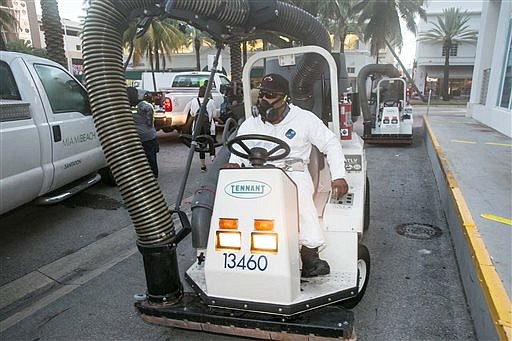MIAMI (AP) - South Beach has been identified as a second site of Zika transmission by mosquitoes on the U.S. mainland, and containing it there will be difficult because high-rise buildings and strong winds make it impractical to spray the neighborhood from the air, officials said Friday.
Five cases of Zika have been connected to mosquitoes in Miami Beach, bringing the state's caseload to 36 infections not related to travel outside the U.S., Florida's governor and health department announced Friday.
The discovery prompted the U.S. Centers for Disease Control and Prevention to announce it was expanding its travel warning for pregnant women to include an area in Miami Beach known for nightclubs, pedestrian thoroughfares and beaches.
Zika infection can cause severe brain-related birth defects, including a dangerously small head, if women are infected during pregnancy.
The virus's apparent spread from a Miami neighborhood popular for day trips to the South Beach streets where many tourists sleep has rattled the tourism industry, even in the slower summer season.
Gov. Rick Scott has directed Florida's health department to offer mosquito spraying and related services at no cost to Miami-Dade County's hotels, restaurants and tourist attractions. More than 15.5 million people made overnight visits to Miami and nearby beaches in 2015, with an impact of $24.4 billion, according to figures from the Greater Miami Convention and Visitors Bureau.
The CDC previously warned pregnant women to avoid the Wynwood arts district in Miami. In its statement Friday, the agency said pregnant women may also want to consider postponing nonessential travel throughout Miami-Dade County if they're concerned about potential exposure to the mosquito-borne virus.
"We're in the midst of mosquito season and expect more Zika infections in the days and months to come," said CDC director Dr. Tom Frieden. "It is difficult to predict how long active transmission will continue."
Aerial spraying and door-to-door operations on the ground have cut mosquito populations in Wynwood by up to 90 percent, but Zika may be continuing as mosquitoes breed, Frieden told reporters Friday.
"The mosquitoes are persistent and we won't know for a couple of weeks whether these aggressive measures have worked," Frieden said.
Aerial spraying isn't practical over South Beach because of the height of its buildings and strong winds over the narrow island city, Frieden said. Officials will be limited to spraying for mosquitoes at ground level in the highly populated area.
"Miami Beach does have a series of characteristics that make it particularly challenging," Frieden said.
Two of the people infected in Miami Beach are Miami-Dade County residents, and three are tourists, including one man and two women, Scott said. The tourists are residents of New York, Texas and Taiwan.
The new area of infection in South Beach is roughly 1.5 square miles between 8th and 28th streets, according to Florida's Department of Health.
Miami Beach Mayor Philip Levine said during a news conference Friday afternoon that the Zika reports certainly aren't ideal for tourism, but he expects the long-term impact to be relatively minor. He said city workers are trying to get rid of standing water and foliage that might attract the virus-spreading insects, while the county begins a fumigation program to kill the bugs.
"Between our efforts and the county's spraying efforts, the last thing I'd ever want to be on Miami Beach is a mosquito," Levine said.

